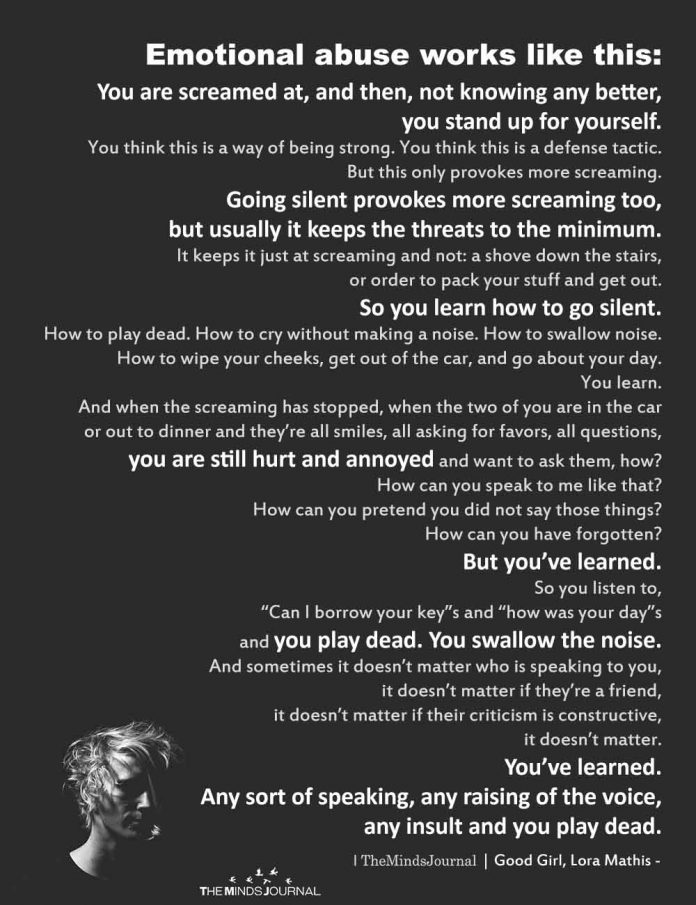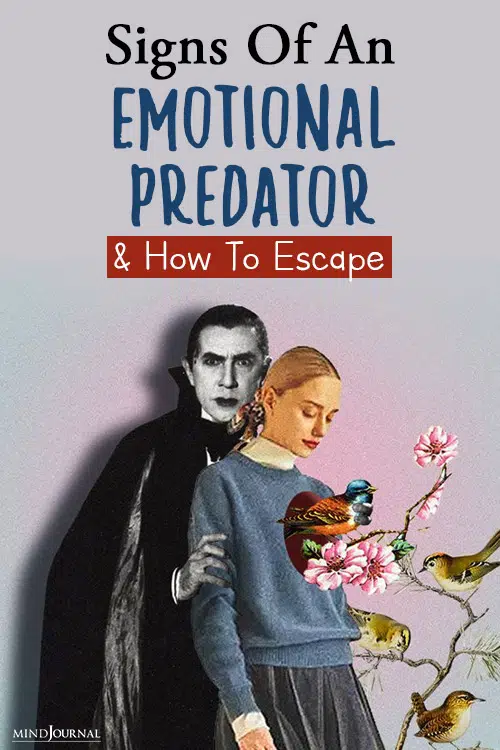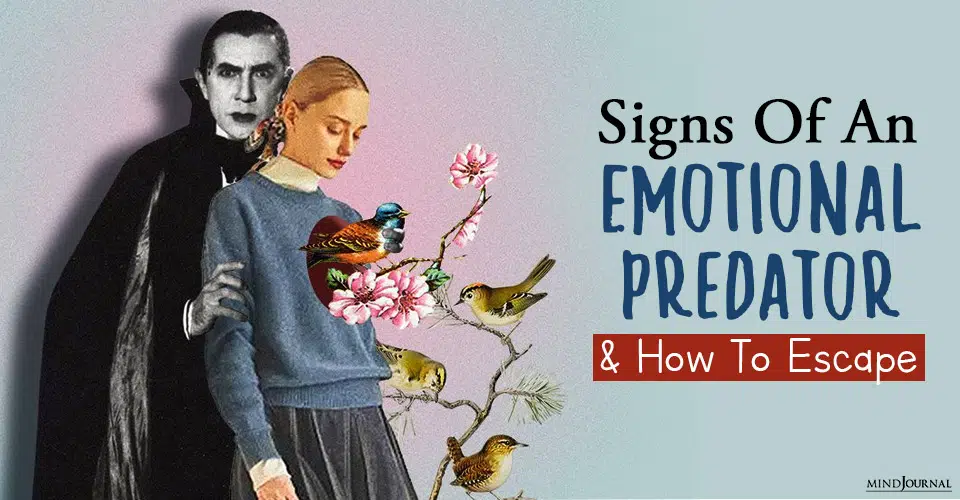Relationships are meant to make us better human beings and help us stay on the right path. That is why every person out there is always looking for that one special relationship that will help them be better people. However, like healthy and stable relationships, there are many emotional predators in emotionally abusive relationships, who end up destroying anyone who is caught in their clutches.
In unhealthy relationships, the emotional predator destroys you mentally by trapping you in their prison of emotional abuse, and pain.
Just like animal predators stalk their prey, wait for the right time to pounce on them, and then devour them, emotional predators do the same. They look for people who they can manipulate, and brainwash so that they end up doing their bidding all the way. An emotional predator does not care about you in the slightest, and the only thing they know is how to exploit you and cause you pain.
In order to protect yourself from an emotional predator’s manipulation and dirty tricks, it is important to understand how their mind works, and how their personality actually is.
Related: How The Emotional Abuser Traps A Victim
Here Are 4 Characteristics Of An Emotional Predator
1. They feed on your energy and suck you dry.
Emotional predators are emotionally stunted people who in reality hate themselves and harbor a lot of resentment in her heart. In order to make themselves feel better about their flaws and shortcomings, they focus on positive and emotionally healthy people and proceed to suck out all their happy, and positive energy. They normally target people who are compassionate, empathetic, kind, and cheerful; all those qualities that an emotional predator severely lacks.
Because they envy these beautiful people, they want to humiliate them, destroy them emotionally, and psychologically put them down, and hurt them in any way they can, just so they are not constantly reminded of how sad their own lives actually are.
2. They change colors like a chameleon.
Fakeness is their middle name, and they are in no way real or authentic with people. They change colors according to the people they meet, and the situations they are confronted with. One minute they are the best people you can ever meet, and the very next moment they can be your worst nightmare; it all depends on what and how much they need from you.
Anybody can be an emotional predator – a family member, a friend, spouse, work colleague, etc. They are masters at self-preservation, and the way they switch personalities, they can give the best actors in this world a run for their money!
3. They do not possess the ability to feel and handle emotions.
The biggest reason why emotional predators are the way they are is that they are horribly incapable of connecting with their emotions. They find it extremely hard to find a strong connection between the emotions they feel, and their mind. This lack of connection normally starts from a very young age, which is why they never see it as something abnormal; they just get used to it.
This sense of disconnection can be traced back to their childhood, where they might have been emotionally abused and neglected, and as a defense mechanism, they have in a way shut off their emotional side. Because they do not feel their emotions like normal people do, they end up seeing everyone as objects, and not human beings.
Related: What Is Emotional Abuse? 10 Signs You’re Being Emotionally Abused
4. They have a hard time accepting themselves.
An emotional predator always wants to hurt and humiliate good people, because deep down inside they hate themselves, and have never been able to accept themselves for who they are. Also, they have never dealt with all the pain, and hurt they might have been subjected to as a child, which is why they hurt other people and want to make them go through the same pain they did.
Whatever anger, and pain they have in their heart because of their painful past, they want people to experience the same thing. That is why, they look for naive and good people, and hurt them in ways they were hurt.
Once you identify the signs that someone might be an emotional predator, you need to know how you can get out of their clutches, and cut ties with them for good.
Many times, victims don’t even realize that they are in a relationship with an emotional predator, and they subconsciously tend to defend everything their toxic partner does. This just gives the predator more fuel to abuse you, and manipulate you to the point where you start feeling emotionally drained and depressed all the time.
Related: 20 Subtle Signs of Emotional Abuse
So how can you know that you are in a relationship with an emotional predator?
In order to truly understand what kind of a relationship you are in, ask yourself these questions, and if you answer yes to most of them or all of them, then unfortunately you are in a relationship with an emotional predator.
- Are you always feeling guilty about something or the other?
- Are you always apprehensive and afraid of expressing your opinions, because you fear that your partner will lose their temper?
- Do you always feel like somewhere down the line, you have lost yourself, and your essence?
- Do you feel alone, and isolated, even when you are with your partner?
- Have you lost touch with your family and friends, and it seems like it’s always just you and your partner?
- Has your way of thinking changed drastically, and you are mirroring your partner’s thought process most of the time?
- Have you stopped valuing yourself, and your feelings?
- Have you shut yourself down emotionally?
- Do you feel mentally and emotionally exhausted all the time?
- Do you need to walk on eggshells around your partner?
- Do you find yourself justifying your partner’s toxic behavior all the time?

Here Are 4 Ways You Can Escape From An Emotional Predator’s Prison
1. Realize what is going on.
The very first step for breaking an emotional predator’s cycle of abuse is by knowing what is going on. The moment you realize their true colors, and see them for who they are, then only you will be able to leave them for good.
They might try to emotionally blackmail and manipulate you, but you have to be strong, and not fall for their crocodile tears and empty words.
Related: When Emotional Abuse Makes You Feel Like Love Is Something You Have To Earn
2. Understand exactly how an emotional predator is manipulating you.
As the victim, you need to understand and accept the fact that you were not guilty of anything that the emotional predator accused you of. It was always them. It was all them. Toxic people like them will always try to pin you down, and dump all their toxicity on you, solely because they in incapable of remorse.
That is why you need to stop justifying their bad behavior, and finally see them as they truly are: monsters. The more you excuse their behavior, the more they will dig their claws into you. The moment you call out their toxicity, you will break the cycle of abuse and will be able to leave for good.
3. Turn towards therapy if needed.
Not everyone is strong enough to get out of the clutches of their emotional predator and can have a hard time leaving them. In such cases, going to a psychologist or psychiatrist can be helpful, as they can help you see things in an objective way, and give you good advice about how you can leave your tormentor permanently.
Professional therapists can help you find yourself again, and also help you bring back your confidence, and inner strength.
4. Make sure that you have a strong support system.
Having a supportive family, and friends who will always have your back is crucial in situations like this. It is not an easy thing dealing with emotional predators, and most of the time it can be exceptionally challenging to handle such toxic, and emotionally depleting things alone. Family and friends who you trust completely can play a big role in helping you get out of such undesirable circumstances.
So, make sure that you have good and trustworthy people on your side; people who you can count on and look towards for support when you need it the most.
Related: 13 Practical Ways To Cope With Emotional Abuse
Having an emotional predator in your life can be dangerous for your mental health, inner peace, and soul. The more you let them feed on your goodness, the more you will lose yourself. So, do not let them take advantage of you any longer, and cut the cord for good.

















Leave a Reply
You must be logged in to post a comment.